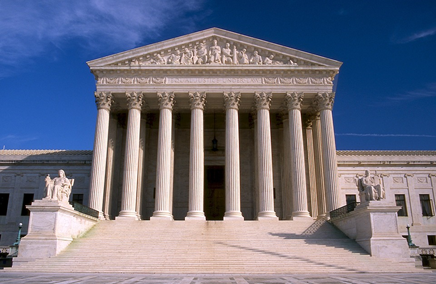
On June 22nd, 2018, the United States Supreme Court ruled in Carpenter v. United States, 585 U.S. ___ (2018) that the government’s acquisition of cell-site records was a search within the definition of the Fourth Amendment and, therefore, the warrantless acquisition by law enforcement was illegal.
In 2011, police officers arrested four men in connection of robbing a series of Radio Shack and T-Mobile stores in Detroit, Michigan. One of the men confessed to the crimes and gave the FBI his cell phone number, identified 15 accomplices and provided some of their cell phone numbers. Based on that information, the prosecutors obtained court orders under the Stored Communications Act to obtain cell phone records for Defendant Timothy Carpenter and other suspects. That statute permits the government to compel the disclosure of certain phone records when it “offers specific and articulable facts showing there are reasonable grounds to believe” that the records sought “are relevant and material to an ongoing criminal investigation”. 18 U.S.C. §2703(d). The records obtained by the cell phone carrier companies included the date and time of calls and the approximate location where calls began and ended based on the cell-site location information (e.g., connections to particular cell towers). On the basis of these records, the government charged Timothy Carpenter with aiding and abetting armed robbery affecting interstate commerce, contrary to 18 U.S.C. §1951.
Carpenter moved to suppress the phone records in trial court based on Fourth Amendment grounds, in that the government unlawfully seized evidence possessed by the defendant without obtaining a search warrant. The government countered and said that the “third-party doctrine” exception applies to this case because the property in question was in possession of the cell phone carrier companies, not the defendant. The government relied on prior Supreme Court decisions where it was held that “a person has no legitimate expectation of privacy in information he voluntarily turns over to third parties.” Smith v. Maryland, 442 U.S. 735, 743-744 (1979). More specifically, the Supreme Court has held that a person does not have an expectation of privacy in his physical movements and movements when the government seized records relating to information from a person’s “beeper” signal. United States v. Knotts, 460 U.S. 276 (1983). The trial court agreed with the government and declined to suppress the evidence, ultimately resulting in the defendant’s conviction and sentence of 100 years in prison. The Sixth Circuit Court of Appeals upheld the conviction.
In a narrowly divided 5-4 decision, the U.S. Supreme Court reversed the conviction on the grounds that this search should have been subject to Fourth Amendment protections. Chief Justice Roberts, joined by Justices Ginsburg, Breyer, Sotomayor and Kagan, declined to extend the “third-party doctrine” exception to this case because the expectations of privacy applicable to GPS and beepers in the past are not appropriate for cell-site records. The information collected and held by the cell phone carrier companies not only records the phone calls and text messages made, but also “a detailed and comprehensive record of the person’s movements” for any and all periods that the cell phone is turned on. This information is far more vast and intrusive than past digital items and should be accorded a higher degree of privacy, especially given that most people simply don’t realize what kind of data is actually collected from their cell phones. Therefore, the government should have obtained a search warrant.
Justice Kennedy filed a dissenting opinion, joined by Justices Thomas and Alito, indicating that cell-site records is no different from other digital records so the “third-party doctrine” should have applied. Justice Thomas went further and stated that the cell phone carrier was the owner of the information, not the defendant, so there was no Fourth Amendment right to assert. Justice Gorsuch also dissented on the basis that the Court was arbitrarily moving away from substantial case law and the original meaning of the Fourth Amendment.
The Supreme Court made it clear in its opinion that this was a narrow ruling intended to apply ONLY to cell-site records and NOT to other types of cellphone information such as phone numbers and text messages. However, electronic information is becoming an ever-increasing dominant force in society as more and more people are plugged into social media, apps and data storage in the “cloud”. The level of “intrusion” into personal space will only grow. The Supreme Court in future opinions will have to decide whether to continue the course and encompass more digital data under Fourth Amendment protection or reverse direction and reapply the “third-party doctrine” to these situations. For now, the government must observe strict constitutional protections in obtaining cellphone location data for the purpose of criminal convictions.





